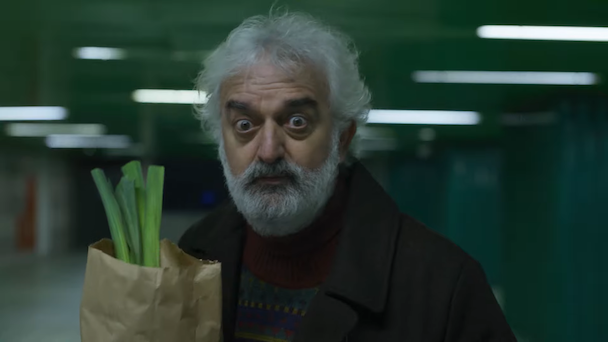Publicis Italy’s top creatives explain how to stay on the right side of controversy

By Sam Bradley | Senior Reporter
February 21, 2022 | 9 min read
Listen to article 4 min
The best chief creative officers in the world talks to The Drum about how the world’s best creative agency creates work that challenges brands and audiences.

Publicis Italy’s latest campaign for Netflix uses the power of its ‘Tudum’ audio ident
Publicis Italy has a talent for projection. Its campaigns for brands such as Netflix, Heineken and Diesel routinely travel far beyond the borders of its home market, carried by its distinctive, wry humor and a willingness to vault boundaries.
What other agency would challenge real Romanian witches to predict the complex plot of hit streaming series The Witcher? Or cheekily dissolve the aura surrounding that most English of cinematic heroes, James Bond, in service of his lager sponsor?
Its success in recent years can be seen in the agency’s place in the World Creative Rankings – it was ranked best in the world this year. But according to chief creative officer Bruno Bertelli, who is also global chief creative for Publicis Worldwide, it hasn’t been an easy 12 months.
”I think last year was even harder than the previous one,” he tells The Drum. While the team occupied themselves in 2020 adapting to life amid the novel coronavirus (Italy was one of the first, and worst-hit, countries in Europe), he says settling in for the long run proved difficult.
”The big issue was on creativity. When you’re in the same room you can really concentrate, you can go deeper. When you’re on a Teams meeting, you can have a bit of a chatter but it risks being superficial.”
In response, Publicis’s creative teams have continuously navigated local Covid restrictions in order to meet up and work in person. There have been some benefits; while the agency’s creatives must ensure work is more topical than ever (”Today, to be relevant you need to be topical. You cannot spend six months coming up with an idea. Speed is crucial”), they are given regular downtime to recover from each campaign sprint.
His colleague Cristiana Boccassini, chief exec and chief creative at Publicis Italy and Le Pub Amsterdam (and 4th in the World Creative Rankings) says advertising can’t stand alone any longer.
”The crisis helped us to be sharper on our positioning and to be more relevant in our current culture. Today, advertising is not enough in itself, it needs to be deeply anchored in culture. This helps our work to be more relevant and to give brands a clear role in our society and people's lives.”
Bertelli says staff won’t be expected to travel as much for the sake of showing their faces, and he says the forced informality of life in lockdown has improved client relationships.
”I’ve noticed that there is much more trust with clients now. The fact that you present on Teams when you’re showing the work – it’s not like a typical agency presenting to the client. It’s much more informal.”
Challenging work
The risk of superficiality is something Bertelli and his cohorts spend a lot of time thinking about. Some of Publicis Italy’s most successful recent work has traded on a careful understanding of subjects other creative teams would steer well clear of.
Its ’Francesca’ campaign for Diesel is a prime example. The film depicts the life and loves of a young transgender woman as she prepares to join the church and was ranked as one of the best campaigns in the world last year.
”We risk a little bit with ’Francesca’,” Bertelli says, ”because the film aired in Italy, where we have the Pope and where religion is very, very important. But the way it was shot, I think was appreciated. There is an image that to me is very important, when she looks into the camera. It’s quite inclusive, it’s not a ’fuck you’. It’s a bit more subtle.”
When it comes to controversial subjects, he says: ”It’s not about people’s lives, it’s about being relevant and disruptive in society. It’s a big shift that brands have taken in the last five years and now it’s no more about how a brand changed my life or inspired me – it’s much more about how brands can be relevant in society.
”For Diesel, this means challenging conformity. We realize that with fashion brands there are a lot of conformities that can be challenged. All the other brands are doing something one way and Diesel is always doing the opposite.”
Knowing what subjects might welcome further exploration or discussion is essential, he says. ”You need to know exactly what your space is. You can’t overdo it... for example with Black Lives Matter, every single brand jumped on it. Not all of them were actually – to me – allowed to do it. You need to understand your space and then be consistent.”
Boccassini also emphasizes the importance of consistency. ”The key point is to be consistent with the strategy and the tone of voice. If a brand is consistent, there is less chance of it being perceived as controversial. What's important is to have a clear point of view that can resonate with your core target,” she explains.
”The second step is not only to claim your point of view but to bring it to action. In this way, it will not feel contrived. It's not only about being controversial, it's also about doing something meaningful for the brand and the culture.”
New surface area
Looking at a brand from the outside in can help, she says. ”We picture the brand as a person with its own language and behaviour. In this way, you’ll find the right balance that’s appropriate to the brand. Usually, you get criticism when your behaviour is seen as inappropriate to your core target. We identify brands as people, so the most important thing is to be consistent and have a clear point of view that remains constant.”
Bertelli says fashion brands such as Diesel are particularly well suited to reaching audiences in this way. ”I’m very interested in fashion brands. I think it’s the most interesting category at the moment. 10 years ago, they were completely relevant – they were in their corner talking about clothes. Today they are relevant to your lifestyle.
”Look at what Gucci is doing, at what Balenciaga is doing. It’s so exciting. We should be inspired in our industry by what fashion brands are doing, and how they’ve managed to become relevant in society again.”
The legacy of an established brand can sometimes get in the way of delivering such messages. Part of the agency’s task is to find new surface area for their clients to operate in – apparent in one of its most recent campaigns for Netflix, which exploited the streaming service’s familiar audio ident (internally dubbed the ’tudum’) as a portent of events to come.
”It’s a big challenge. The minute you become the establishment, you’re dead.”
Brands like Diesel and Netflix ”always need to find a way to regain that niche position,” he says. ”They always try to find an alternative angle in order to not become like the establishment.
”Netflix has become one of the most popular brands in the world thanks to the pandemic. The challenge for it is to stay alternative, to stay as a challenge, as an underdog.” Hence the witches and the ’tudum’ in place of the bog-standard teaser trailer, both of which swiftly gained recognition far beyond Italy.
”Sometimes it’s about being irrational,” he concludes.